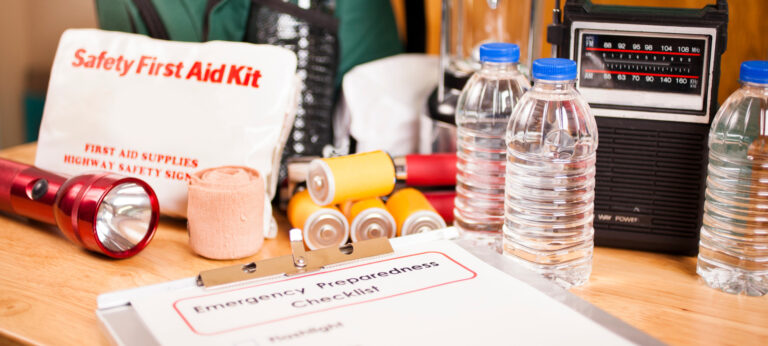As the recent devastating Maui wildfires and Hurricane Hilary demonstrated, disasters can strike at any moment with little time for preparation. That’s why Disaster Preparedness Month is a crucial reminder that being ready can make all the difference. From natural calamities to unexpected emergencies, having a plan in place can help protect you, your loved ones, and your property. In this blog, we’ll provide you with a comprehensive guide to prepare for the unexpected and ensure your safety during disasters.
1. Create a Family Emergency Plan: Start by discussing emergency procedures with your family members. Identify safe meeting places both inside and outside your home, and make sure everyone knows escape routes and how to reach each other. Designate a family member as the main point of contact, and ensure everyone has their contact information.
2. Build an Emergency Kit: Gather essential supplies in a portable emergency kit. Include non-perishable food, water, medications, first aid supplies, flashlights, batteries, a multi-tool, a whistle, and important documents like identification, insurance papers, and medical records. Keep this kit in an easily accessible location.
3. Stay Informed: Follow news updates and weather forecasts to stay updated and respond effectively to natural disasters and other emergencies.
4. Secure Your Home: Inspect your home for potential hazards, such as weak structures that could be problematic during natural disasters like earthquakes. Reinforce doors and windows and regularly check smoke detectors, carbon monoxide detectors, and fire extinguishers.
5. Develop Evacuation Plans: In the event of an evacuation, have a plan in place. Identify multiple routes to exit your neighborhood and establish a meeting point for family members if you’re separated. Keep your vehicle fueled and well-maintained in case you need to evacuate quickly.
6. Stay Connected: Maintain communication with your neighbors, especially those who might need assistance during emergencies. Having a supportive community can provide additional safety and resources during challenging times.
7. Prepare for Specific Disasters: Different disasters require specialized preparations. For earthquakes, secure heavy furniture, appliances, and other items that could fall or cause injury. For floods, elevate utilities and important possessions, and create barriers to divert water away from your home. For wildfires, create defensible space around your property by removing dry vegetation.
8. First Aid and CPR Training: Enroll in a First Aid or CPR course to learn essential life-saving skills. Being able to provide immediate medical assistance to yourself or others can be invaluable during a disaster when professional help might be delayed.
9. Pet and Livestock Preparedness: Don’t forget about your furry friends and livestock. Have a plan for their care during emergencies, including food, water, medications, and transportation. Some shelters may not accept animals, so research pet-friendly accommodations in advance.
10. Review and Practice: Regularly review your family emergency plan and update it as needed. Practice evacuation drills with your family so everyone knows what to do and where to go. Familiarity with the plan can prevent panic during actual emergencies.
This Disaster Preparedness Month, we are reminded to prioritize the safety of ourselves and our loved ones. By following these essential tips, you can be well-prepared to face a variety of emergencies. Remember, disaster preparedness is an ongoing effort – investing time and energy now can protect what matters most in the future. Don’t hesitate to reach out to us at 818-302-3060 if you have any questions or concerns.




